Chris Martin’s Influence Re-Launched Peddie School to Powerhouse Status
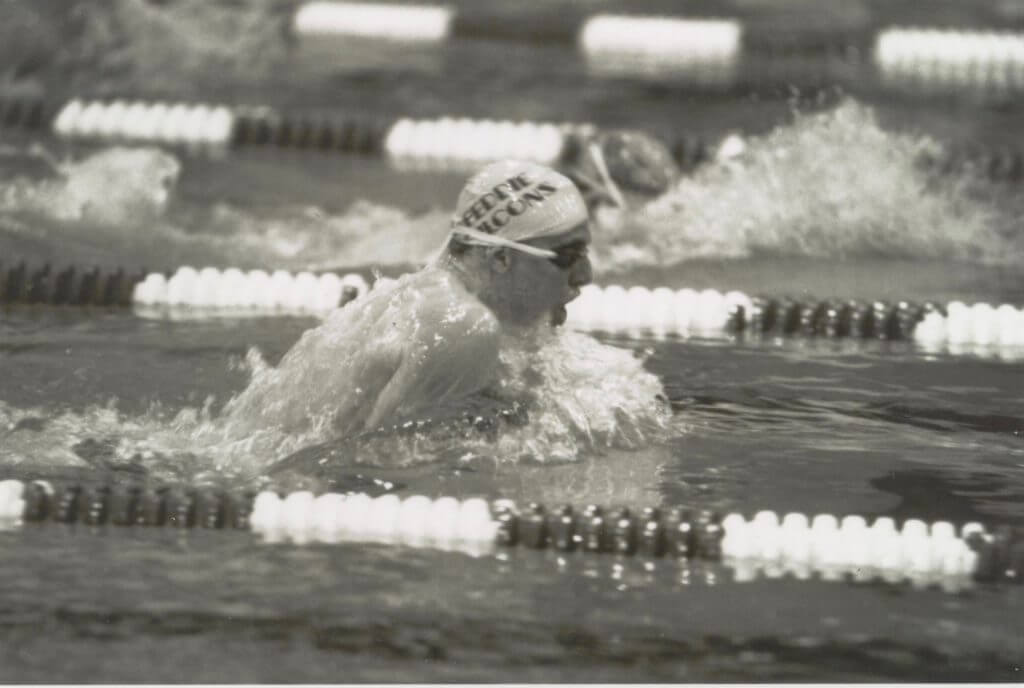
Swimming World first began recognizing the top high school teams in the country in 1971. Since then, three schools stand out as the most successful among independent schools. Featured in the magazine’s September print issue is The Bolles School of Jacksonville, Fla., which has captured the most national prep school titles with 18—10 boys’ and eight girls’—as well as 12 combined championships (public and independent schools).
Following Bolles for most national independent school titles are Germantown Academy (Fort Washington, Pa.) with 10 and The Peddie School (Hightstown, N.J.) with nine. Germantown’s girls have also won four combined championships, while Peddie’s boys’ and girls’ teams have each captured three public/independent school titles. Below is the story of the Peddie School’s success.
When 26-year-old Chris Martin was hired in 1986 as the head coach of the swim team at The Peddie School, it had been years since their glory days as a high school team. The New Jersey school last won a national championship in 1982, and the school was eager to see success again as they had with Coach Jeff Lowe.
Martin, who had swum four years at Germantown for legendary coach Dick Shoulberg, quickly instilled his philosophy at Peddie.
“The best compliment I ever got was from a colleague who said, ‘You don’t coach teams, you coach anti-teams!’” said Martin, who is now the national team coach for Malaysia. “What it meant was I had a different outlook on what teams were about and a lot of times people use the idea of teams, community toward a word called the greater good, and often that involves someone sacrificing for someone else without the choice.
“And I know I had a thing with the kids where I said I would never ever sacrifice anyone’s personal potential or development for the good of the group. And that became a thing with us. The things that happened were a result of that outlook on life. Nobody sat around saying, ‘Can we win this? Can we win that?’ Everyone put in.”
THE START OF SOMETHING GOOD
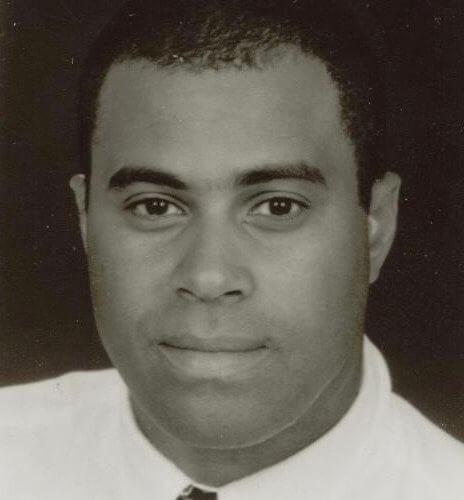
Chris Martin was head coach at the Peddie School from 1986 – 1992. Photo Courtesy: Swimming World Archive
It didn’t take long for the kids to buy in, as Martin vividly remembers Laurie Matheson dropping nearly 10 seconds in the 500 yard freestyle in one year from a 5:00 to a 4:51.95, where she won the 1987 Juniors in Martin’s first season at Peddie.
“That started it all. Everyone started coming and working hard and getting faster.”
By 1989, the Peddie girls’ team won its first combined national championship (public and independent schools), as compiled by Swimming World. Prior to that, the magazine recognized Peddie as the national independent school champions for girls in 1982 and for boys in 1977.
But as far as Martin’s first national title in 1989 was concerned, it was only fitting that it came over his former mentor, Shoulberg, and the Germantown Academy: “Shoulberg taught me everything about swimming,” Martin said in 1989.
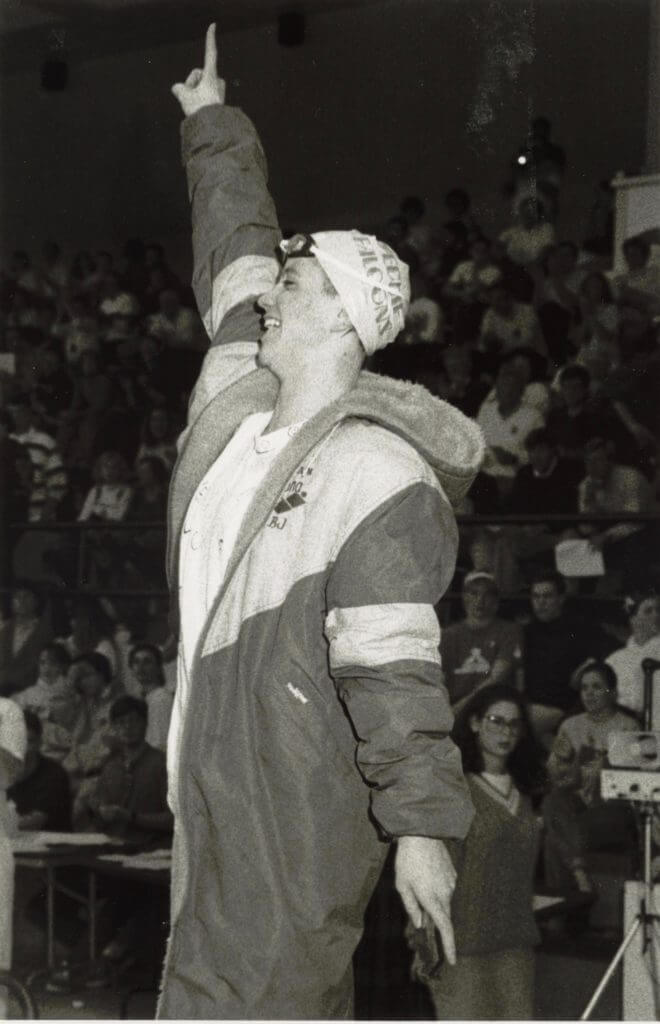
Barbara Bedford. Photo Courtesy: Swimming World Archive
The next season, Peddie swept the boys’ and girls’ combined national titles, led by Nelson Diebel and Barbara Bedford, who went on to win Olympic gold medals for the United States later in their careers: Diebel in 1992 in the 100 breast and 4×100 medley relay, and Bedford in 2000 in the 4×100 medley relay.
“We didn’t quite hit the unbelievable things that happened at Germantown in terms of training,” Chris Martin said. “But we did a lot of training! We had a thing where if you broke an hour 40 minutes for a 10,000 straight, you could go on a ladder and sign your name on the pool wall, and we probably had seven or eight boys do that…and a couple girls, too.”
Martin coached Chuck Batchelor and Josh Stern during his time at Peddie, who both went on to have successful careers in coaching and were known for giving out punishing sets. Batchelor is perhaps most famous for coaching a 15-year-old Elizabeth Beisel to a spot on the 2008 Olympic team in the 400 IM and 200 backstroke, as well as leading a primarily-distance based program at Bluefish Swim Club. Stern is most famous for coaching “one of the all-time great trainers” in Erik Vendt, who once swam a 30×1000 in a workout.
“I take pride in that,” Martin said of his swimmer’s dedication to training. “The thing about Peddie was that every single kid who put up with it earned my undying respect. I sometimes feel like my coaching and life has been living up to their commitment because they went for it.”
MEETING THE CHALLENGE
And the kids weren’t afraid of the challenge.

Nelson Diebel, Chris Martin and Barbara Bedford on the cover of Swimming World in August 1990, celebrating the Peddie School’s national title.
“They always wanted to go do the extra mile,” recalls Martin. “The kids that did 200s would try 500s. Kids that did the 200 IM would try the 400 IM. Kids that did 50s would try 100s. People would train over their race to try to see if they could stretch it out just as a concept. I really liked that. The best part about coaching was the ‘faster’ swimmers had the ultimate respect for the newest kids and slowest kids if they worked hard. That part I loved. That was the thing I really enjoyed the most.”
One particular selfless act done by the swimmers stands out to Martin the most all these years later.
“One year they came to me, and the big thing back then was those “TruWest parkas.” Those were cool then and everyone wanted them, so we got them for the team. They said, ‘We want to get one for the pool maintenance dude,’ who was called Chuck.
“We swam in this old pool, and this guy did all he could to keep it up and keep us in the water all the time. When the kids came to me and asked if they could get a parka for him, I was like, ‘Of course!’
“And this guy had the big hair of the 80s, and he wore that parka every day! I was so proud, and he got all emotional when they gave it to him, and I was like, ‘These are the kids you want to be around.’ Even though they were working that many hours a week, they could see the bigger picture. I still have great respect for what they did.”
PEDDIE POWERHOUSE
Chris Martin had built a powerhouse at The Peddie School, and by 1992—after capturing two straight combined national high school championships for both the boys and girls—their focus was beyond winning a high school national title. The 1992 Olympic Trials were held in early March, and they decided to go all-in on Trials.
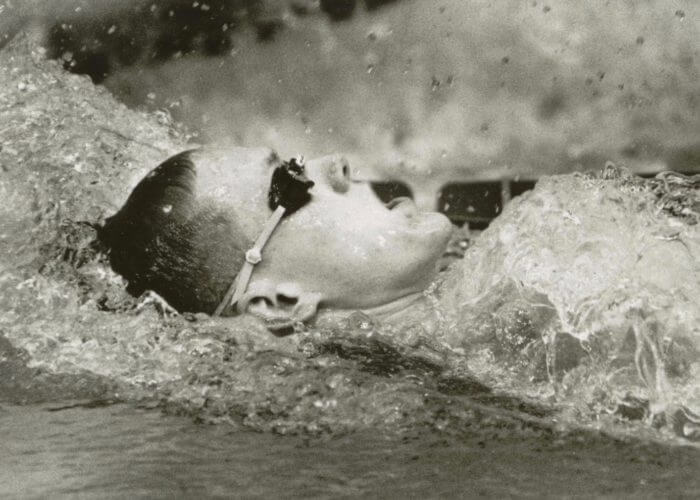
Royce Sharp. Photo Courtesy: Tim Morse / Swimming World Archive
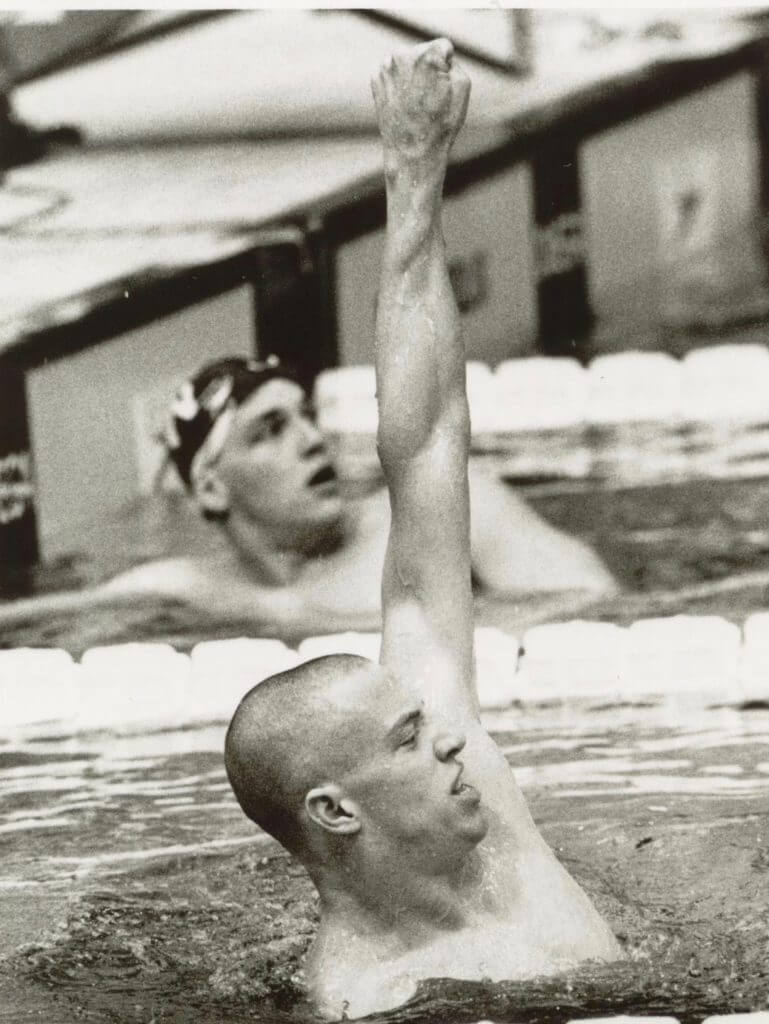
Nelson Diebel at the 1992 Olympic Trials. Photo Courtesy: Tim Morse / Swimming World Archive
“I asked them, ‘Do you want to shave for the big high school meet?’ Martin recalls. “It was (the) Olympic Trials year, and all the kids were like, ‘No,’—and they knew they weren’t going to make the Olympics, but they wanted to be able to say that they went for the highest thing and they did that. They chose that. I’ve always asked people years later if that was the right thing to do, and they just laugh and say, ‘Of course it was!”
Diebel won the 100 breast and Royce Sharp won the 200 back, with both of them making their first Olympic team, and Chris Martin was selected as an assistant coach for Barcelona. The honor made him the first black swim coach in U.S. Olympic history.
“I took maybe 13 or 14 kids (to Trials), and a bunch of them made the finals. It was a great meet for us.”
THE LOOZE ERA
Martin left the Peddie School for the University of Florida in 1992, and in came Ray Looze in the fall of 1993.
“Chris would have been a hard person for anybody to follow,” Looze said, who is now the head coach at Indiana University. “He was a very charismatic person, kind of ruled with an iron fist, so he would have been hard for anybody.”
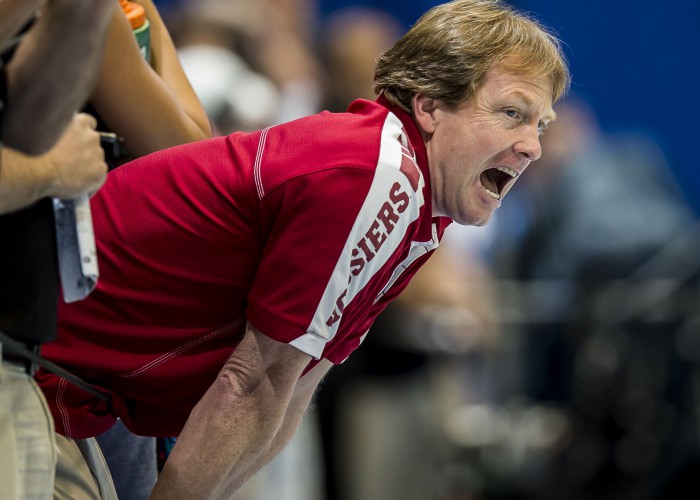
Ray Looze was head coach at the Peddie School starting in 1993. Photo Courtesy: Peter H. Bick
“My first year at Peddie, we weren’t very good at all. We did a training trip in Orlando and dueled with Bolles, and we didn’t win one race. And Gregg Troy took me by the shoulder and said, ‘Ray, if you keep working hard, in 10 years this will be a good meet.’ And I told the team that. I said by next year, we are going to beat them—not 10 years…we are not waiting 10 years.”
Looze, only 25 in his first season as head coach, swam at the University of Southern California, then spent a season coaching at Harvard in Cambridge. It was at the Mass Bay Marlins in Boston where Looze was able to get some of his swimmers to follow him to Peddie.
And when the school received a $100 million donation from one of its richest alums, Walter Annenberg, Peddie was in good financial standing.
“If people had any financial need, we were able to take care of them,” Looze said. “It was just really good timing. Peddie still had a pretty good name, we had really good financial aid, and I had a couple really good coaches who helped me out.
“Rocco Aceto was in Texas and sent me one of his kids, Nick Kaschik, and he had some of the nation-leading times that year, so we had a powerhouse very quickly.”
Peddie was Looze’s first head coaching job, so he was able to experiment with things he couldn’t do as an assistant at other places.
“I had only coached a year at Harvard as the men’s assistant, but Mike Chasson let me coach the club team, so I had never written a workout ever. And he let me coach the club team and we got second at Juniors-East the one year I was there. I learned a lot, and I took that and applied it at Peddie.
“I met with Jon Urbanchek, and I ran a system pretty close to what he did,” Looze said. “I was doing a lot of power tower work back then and underwater kicking work. We did really interesting dryland and weights.
“I was able to do a lot of stuff that not a lot of people were doing at that time. We did power work and probably had four power racks. There were very few people doing power work and working the underwaters. I was able to do a lot of stuff that would be pretty effective, which, in some way, shape or form, I am still using today.”
So by 1995 in Looze’s second season, the Peddie boys won Swimming World’s combined national championship, edging out Bolles.
“We had the benefit to see what (Bolles) went at their state meet in November, and we had an influx of talent.” Peddie swept all three men’s relays in the 1995 high school mythicals, and Looze was able to take down Troy’s Bolles team that same year—just one year after being told it would take him 10 years!
But after two short years on the Hightstown, N.J. campus, Looze went cross-country to the University of Pacific in Stockton, Calif., citing the poor accommodations for a young single person in his mid-20s, as he was at the time.
So, out went Looze and in came Jim Henry—and it was a seamless transition between coaches.
“They just did a better job of hiring, so the team did a good job,” Looze said. “All those kids were still there, so the team was loaded. None of those kids were leaving, they were all underclassmen, so I think the ’96 team was pretty much the same as the ’95 team. They knew what to do at that point—those kids were really good swimmers. They all went on to swim at major top five teams or in the Ivy’s.”
In 1996, Kaschik was a top six finalist nationally in the 200 IM and 100 breast, and Spencer Hawkins was a consolation finalist in the High School Mythicals in the 100 back. The 200 medley and 400 freestyle relays reached the top six, and Peddie won its second straight national prep school championship, although lost the overall title to public school Houston Cypress Creek.
For Looze, his stop at Peddie was instrumental in his current success at Indiana University, where he helped return the Hoosier men to the top four nationally for the first time in four decades.
“I’m still really good friends with all those people,” he said of his time at the Peddie School.




There were other Olympians in the 92 Olympics from the early Chris Team that were left off. Was this because they did not compete for the USA?
I believe Jenn Smatt was a Peddie Swimmer from Bermuda who competed in the 1992 Olympics.